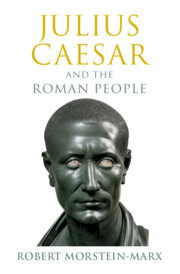Book contents
- Julius Caesar and the Roman People
- Julius Caesar and the Roman People
- Copyright page
- Dedication
- Contents
- Figures
- Acknowledgments
- Abbreviations
- Chapter 1 Introduction
- Chapter 2 The Early Caesar
- Chapter 3 Caesar’s “Entry into History”
- Chapter 4 Caesar’s First Consulship
- Chapter 5 Caesar in Gaul
- Chapter 6 No Return
- Chapter 7 Taking Sides
- Chapter 8 Caesar’s Leniency
- Chapter 9 En Route to the Parthian War
- Chapter 10 Conclusion
- Appendices
- Works Cited
- Select Index of Passages Cited
- General Index
Chapter 3 - Caesar’s “Entry into History”
The Catilinarian Debate and Its Aftermath
Published online by Cambridge University Press: 05 August 2021
- Julius Caesar and the Roman People
- Julius Caesar and the Roman People
- Copyright page
- Dedication
- Contents
- Figures
- Acknowledgments
- Abbreviations
- Chapter 1 Introduction
- Chapter 2 The Early Caesar
- Chapter 3 Caesar’s “Entry into History”
- Chapter 4 Caesar’s First Consulship
- Chapter 5 Caesar in Gaul
- Chapter 6 No Return
- Chapter 7 Taking Sides
- Chapter 8 Caesar’s Leniency
- Chapter 9 En Route to the Parthian War
- Chapter 10 Conclusion
- Appendices
- Works Cited
- Select Index of Passages Cited
- General Index
Summary
Caesar’s famous intervention in the Catilinarian Debate of 63, too often viewed as fundamentally opposed to the Senate's authority, instead illustrates the kind of "patrician republicanism" discernable in his early career. His failed proposal for permanent imprisonment seems to have been intended to avoid the kind of popular backlash against the Senate’s authority that was inevitable if the laws protecting citizens against execution without the People’s authorization against were blatantly violated by that body. His advice was ultimately rejected, but his view of the matter would be vindicated by Cicero’s expulsion in 58. Caesar’s praetorship and successful Spanish command brought further clashes with Cato, whose development of his favored tactic of the filibuster in these years shows that he did not as a rule carry the majority of the Senate, while Caesar’s own pursuit of military glory and cultivation of a "popular" though not aggressively populari persona was consistent with long-standing republican tradition.
- Type
- Chapter
- Information
- Julius Caesar and the Roman People , pp. 83 - 116Publisher: Cambridge University PressPrint publication year: 2021

